Saturday, 01 March 2025
Organic supermarkets may introduce a larger audience to sustainable organic produce and thus spare the environment, but do not necessarily help to reduce the amount of one-way packaging, save plastics. As a conscious consumer you will without doubt prefer non-prepackaged fruit and veges, available from all organic groceries, supermarkets and market boothes, and hand your bag over the bakery counter, making it verbally clear that you do not need a paper bag, to avoid paper waste when buying bread and rolls.
You're also safe if you restrict your shopping of dairy products, juices and soft drinks to returnable glass bottles. Some organic shops (such as Vollcorner) offer a small selection of wine in deposit bottles. Since 2021 we also have seen the gradual arrival of dry food, preserves and spreads in returnable glasses formerly only used for yogurts.
Starting in 2017 the more dedicated organic supermarket chains have been introducing measures to reduce packaging and allow customers to bring their own containers to fill with selected goods.
Unless stated otherwise all shops mentioned in this post will help you out with clean and empty reusable glass jars or organic cotton bags which you – depending on the shop – can either buy or lend if you forgot to bring your own.
Package-free food and household necessities
Early in 2016 the city's first crowd-funded vegetarian zero-waste supermarket Ohne ("without") opened its doors, followed by a
second branch early in 2019. End of June 2023
this became history: The insolvency, following the closing of other independent
owner-run package-free supermarkets earlier that year, left the Eastern,
Northern and central neighbourhoods without a place to effortlessly replenish
store cupboards without producing package waste.
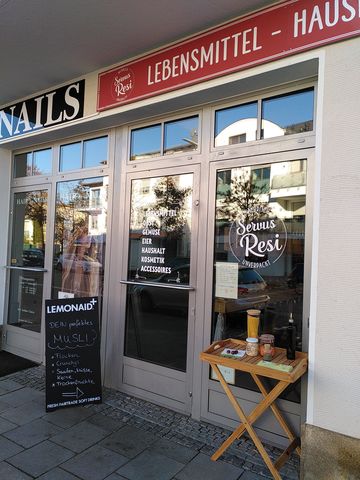
Gone the days of the pandemic spring and summer of 2020 when zero-waste groceries were blooming in town: Approximately at the same time as the Westend got its (now closed) neighbourhood shop, Servus Resi opened in Obersendling right before the lockdown in March 2020, in a non-descript middle of no-where near the Siemenswerke former industrial area. Don't let you fool by the uninviting environment at a noisy car road – what you'll find here is a busy neighbourhood gem nicely furnished in light wood, with a superb selection of dried herbs and spices aside the usual dry food, and a nicely arranged selection of household items. The greengrocery section is rather limited – local organic apples and potatoes in late autumn 2020 –, and there are no dairy or other food requiring cooling, but the shop offers both, liquid body care products and household chemicals from refill stations. Everything is supervised by the friendly shop-owner, Chrissy (not Resi) herself, and if you wish to get in touch with people from the neighbourhood take the burden to come here even from other parts of town.
In Laim Nebenan unverpackt ("package-free next door") followed in summer 2020. The latter is organised as a co-operative (though the location next to a co-operative bank is purely accidental) and sports a
small neighbourhood coffee place. They offer a very good selection of dry food, fresh fruit and veges, but less dried herbs and spices and no spirits. You can however buy wine and their selction of condiments and preserves in one-way glasses have the effect that you can do all the regular daily shopping here in one place if you don't come with more advanced expectations.
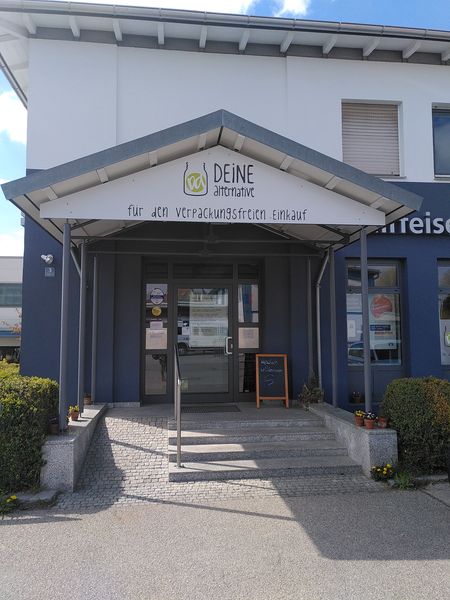
Half a year earlier, in January, 2020 another
co-operative, Deine Alternative ("your alternative") in Zorneding, opened on the premises of the former Raiffeisen co-operative bank, just a few steps from the urban train station.
When you get inside you will however immediately forget about its past as a bank, the shop is carefully and pleasantly decorated, with wooden furniture and equipped with a proper Italian coffee machine for a break in between. Most of the often local produce sold here is organically certified or at minimum sustainably produced, though it would be nice if conventional loose-weight products were clearly marked. In addition to the gravity bins and containers with dry food there's a decent selection of dried herbs and spices, sweets, bread, some confectionery, a small selection of fresh organic greens and veges, cheese and milk from the Nirschlhof organic farm (but interestingly enough no whole-meal flour or oils, vinegars or spirits by the litre). In a separate room you can buy toiletries, household chemicals and items supporting a zero-waste lifestyle. Everyone is welcome, but members of the co-operative pay less.
North of Zorneding, in the municipality of Poing, the co-operative
Bunte Bohne ("coloured/colourful bean") with its zero-waste supermarket cum cafe has been surviving hard times, but starting March 1st, 2025 every first Saturday of a month the place turns into a evening open bar where you can mingle with locals.
The neighbourhood of Trudering (a more than 1200 years old former village and suburb in the Eastern part of Munich) does not have a dedicated zero waste supermarket, but twice a month, on Tuesday afternoons, an indoor farmer's market dubbed Tante Trude ("Auntie Trudie") keeps popping up in the neighborhood associations' offices. Organic farmers offer local produce, and you can donate to the Trudelade project: home-cooked jam made from abandoned fruit trees in the neighbourhood (you'll get a jar as reward).
South-South-West of Munich, the city of Wolfratshausen (the endpoint of the S7 urban train) likewise sports a package-free shop centrally located at the Obermarkt market place: Ohnverpackt, another zero-waste shop opening within the corona lockdown in the spring of 2020,
is even certified organic. The few conventional products of regional origin are clearly marked as an exception. It does not only offer the usual dry food and household chemicals, but also a good selection of cheese and antipasti. What you won't find are fresh fruits and veges, meat and sausages.
There's a small day cafe, unfortunately all closed on Mondays.
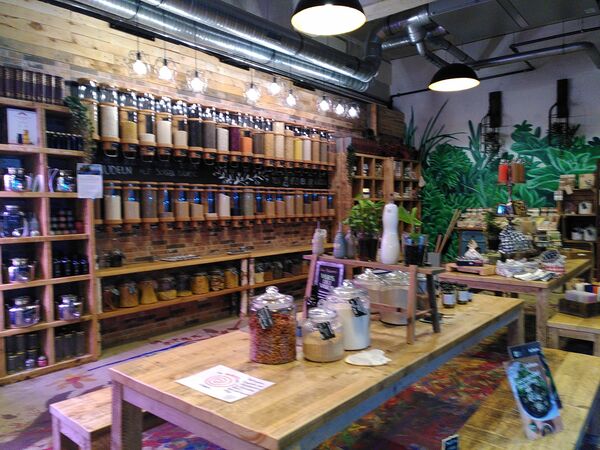
South of Munich, directly located at the S-Bahn station of Neubiberg the owner of the conventional Edeka supermarket opened a side project next door,
Hertscheck Unpacked. Unfortunately the separate organic shop concept did not survive, but is being continued as a shop-in-shop inside the conventional supermarket.
For city dwellers the place may be a destination on
a bicycle ride through the beautiful eco park Umweltgarten Neubiberg where an organic farmer's market is held on Thursday afternoons. Fun fact: The former premises of the Edeka supermarket now host a Vollcorner organic supermarket.
In smaller municipalities, (urban) train stations usually are the only public (and sustainable) transport hub and as such a natural place for zero-waste supermarkets. So I was glad to find a new (in 2022) co-operatively organised organic zero-waste supermarket in Unterföhrung, next to the S-Bahn train station. The shop dubbed
UFG (short for "unverpackt, fair, gemeinsam" – "unpacked, fair, together")
is open to everyone, with a 10 percent discount scheme for members.
It does not only offer dry food, condiments and household items, but also bread, rolls, cakes, dairy products and fresh, predominantly local fruits and veges. On Thursday afternoons you also may buy local organic meat and sausages, cheese and other fresh artisanal organic products from a mobile booth of the Tagwerk co-operative.
There's a small lunch cafe offering organic soups, quiches and sandwiches as well as cereal bowls, coffee, smoothies, tea and cake, all vegetarian, often vegan. Unfortunately you have to register with an app service to take your food with you in a returnable bowl or box, and nevertheless may have to come back to the shop to return it. So better bring your own boxes.
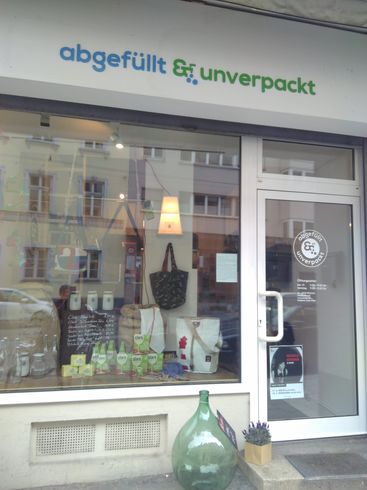
Plastic-free household
In March 2019 a tiny neighbourhood shop specializing in natural home cleaning opened in the Glockenbach neighbourhood: At Abgefüllt & unverpackt ("bottled and unpacked") the singer of the Munich-based band "Cat Sun Flower" warmly welcomes customers and passers-by and helps to (re)fill empty bottles with organic liquid household detergents. At the time of writing this shop was the only one in Munich selling washing powder by weight. In addition there are eco-friendly dishwasher tabs, body and hair soaps, fairly traded natural facecream in returnable glasses, towels, as well as upcycled and fairly traded bags and toiletry accessories.
Supermarket chains
In autumn 2016 the local Vollcorner
supermarkets received an official permit by the Munich Department of Public Order (Kreisverwaltungsreferat) to fill customers' jars and boxes with
cheese, antipasti, processed meat products or cake. Most independent convenience stores will also do this on request. Vollcorner, Lebascha and others provide jars, usually for a deposit. So even if you forgot to bring your containers, take your courage and ask!
The Herrmannsdorfer groceries (e.g. the one at Max-Weber-Platz) even reward you with a few cents discount per saved packaging.
To avoid misunderstandings it is advisable to clearly point to your box (or ask for the deposit container) before placing your order at the sales counter and tell the staff to tape the receipt to it.
The shops of the nation-wide operating Alnatura chain never offered refill dispensers. However, it has been increasing the range of products in returnable jars and bottles continously since 2021 – among others fairly traded nut butters, a number of dry products and even ketchup.
A small selection of dried fruits and nuts in refundable glasses as well as package-free toilet paper can be obtained from Vollcorner supermarkets. Their huge flagship store at Theresienwiese (with butcher's counter and lunch cafe) also experimented with a milk vending machine and a dedicated shelf offering all sorts of products in deposit glasses, but both efforts were discontinued due to low customer demand.
By the end of 2020 a number of conventional supermarket chains had introduced refill stations for dry food, too, but since you still have to do a lot of careful reading in front of the shelves to shop climate-friendly products, I won't mention them here, with one exception: the huge Tegut branch that opened in the Elisenhof shopping centre next to the main train station
in December 2020. This supermarket chain gives their customers a choice – all organic products are easily to recognise thanks to a light-green label on the shelves, and there's a great number of them in all product categories. Given the sheer number of products on sale the impressive refill rack at the left-hand side of the entrance aisle comprises only a negligible fraction of total sales, but it's a good start, and the best: All products in the gravity bins are organic. Come here for the biggest selection of package-free organic chocolate-covered sweets I've come across so far. There are grains, cereals, nuts, dried fruit, legumes and sweets, but no flour and surprisingly almost no pasta.
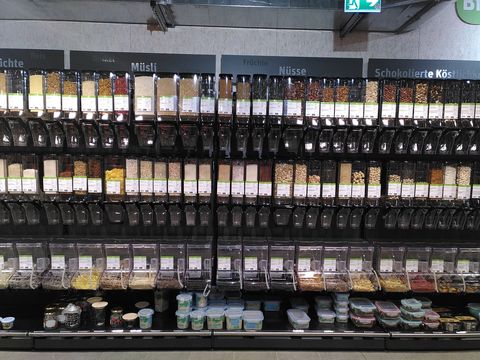
Although the supermarket has its entrance in the Hauptbahnhof basement Tegut is closed on Sundays and public holidays as well as in the evening. When you have at minimum half an hour to change trains you will however reach to refill some of your dry food containers as long as you know how it works: Put your box onto the scales and choose "Tara-Bon". This will print a label. Fill the box and remember the product id on the lower end of the gravity bin. Put the filled box back on the scales and press the second "Bon" button beneath the "Tara-Bon" button. Now you will be asked to type in the product id. Scan the bar code on the previously printed label with the hand scanner, and there you go: A receipt with a price tag will be printed for you. Seal your box with this second label and hurry up to the cash counter.
Until the end of 2022 Basic supermarkets had gravity bin dispensers for pasta, nuts, dried fruit, sweets, grains and more which all disappeared in the course of the company's
insolvency and take-over by the "teGut" chain. Package-free offerings at the remaining "Basic" branches are reduced to fruits and vegetables as well as food from the serviced bakery and butchers' counters.
Neighbourhood groceries
In Haidhausen the Lebascha neighbourhood grocery has been offering to fill all loose-weight products (cakes and bread, eggs, cheeses, olives, jelly gums and liquorice – note that the latter is not organic) in bottles, jars and boxes customers brought along. When the shop was taken over by the Ökoesel co-operative dispensers for grains, nuts and the like as well as household chemicals were added, and you can
buy all types of dried herbs and spices by the gram.
Ask for a deposit box in case you forgot to bring your own.
For home-made dried fruit stroll a few more steps down the street and see whether the Haidhauser Oase is open (which however is rarely the case).
Household chemicals can be refilled at the Echt Bio Markt in Neuschwabing.
In Harlaching, the
independent Biowelt supermarket has a small zero-waste corner with dispensers for dry food, a good selection of loose-weight dried fruit and a dairy and butchers' counter where you can hand over your containers.
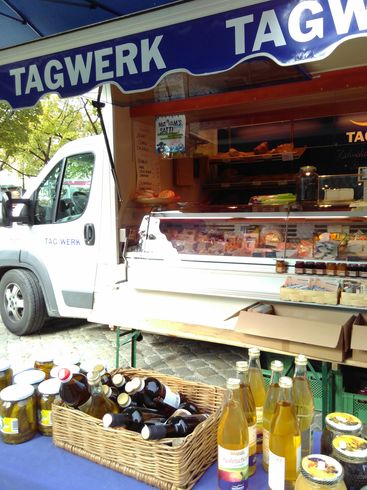
Farmers' markets
Once, sometimes twice a week farmers' markets are installed in many Munich neighbourhoods. Loose fruits and veges prevail here, and boothes selling organic produce (watch carefully for "bio" and "demeter" logos) will usually fill bread, cakes and pastries, antipasti, meat and dairy products into the containers you present. Notably at the boothes of the Tagwerk co-operative and the Hofbäckerei Steingraber you may be surprised to see that you're not the only one coming with her own boxes and jars.
On Saturday mornings you can find them next to the West-facing entry of Mariahilf church, in the neighbourhood of Au. Before the covid-19 pandemics all boothes (except the French fish monger) in the market block next to the church, right below the carillon, were organic,
but now it's no longer that easy. Therefore a comprehensive list: There are three organic market gardens (Biogärtnerei an der Isen alias Avanti Andi, Demeterhof Fahrenzhausen alias O'is bio and a third one also selling flowers and seedlings which you will immediately recognise when greeted with a friendly French accent). Put differently: Simply avoid the biggest greengrocery booth, "Helminger".
For meat, sausages, cheese and other dairy products there are the aforementioned two producers, and in addition the farm sale of Bergwinklhof Monigottsöd. The latter also offers a small selection of wine, but for good and knowledgeable advise on wines or non-alcoholic drinks to accompany a meal you'll better pay a visit to Uli Scheffler's organic wine trader's booth. While the juices are readly available in deposit bottles, returnable wine bottles are still very rare, and not used for high-quality wines.
If you feel adventurous on Thursday afternoons take the urban train S7 in direction Aying/Höhenkirchen-Siegertsbrunn/Kreuzstraße (or a bike ride) to the suburb of Neubiberg and pay a visit to the communal organic market on the pleasant premises of the Umweltgarten eco park, a true oasis within ugly suburbanity, with a small zoo, popular not only among kids. On Thursdays there's also an all-day market at Rotkreuzplatz. As on Mariahilfsplatz about half the boothes here are organic, though scattered all over the market area, with a cluster in direction Nymphenburger Straße.
Needless to say that the organic boothes on the famous Viktualienmarkt in the Munich city will happily support you when you make it clear that you want to use your own bags and containers. And the spring of 2021 did not only see the opening of an organic bakery in one of the solid market stalls in the northern part of the market, but also a tiny organic food shop for organic dry food grown and produced in the nearby Chiemgau region:
Satt und gut ("full and good") sells staple foods like grains, flour, eggs, honey and oil but also cookies, both pre-packaged and loose weight, partially from the smallest gravity bins I've seen so far. Note that this shop, unlike the market itself, is closed on Mondays
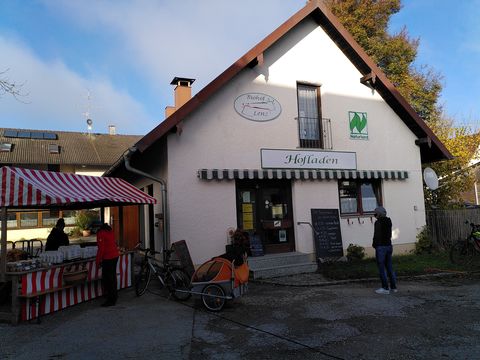
In Zorneding a small farmers' market is being held every Friday on the premises of the Biohof Lenz organic farm. Here you can buy local organic meat and meat products, cheese, bread, veges, and occasionally honey and bee products, wines and spirits. Although most stalls are organic there are a few exceptions offering conventionally produced specialities. The Lenz family's own farm shop keeps open at the same time and on Saturdays, but for buying their exceptionally good meat you should subscribe to their newsletter and order beforehand according to availability (you should be fast to answer). Unfortunately all the Lenz meat and sausages are vacuumized in plastic.
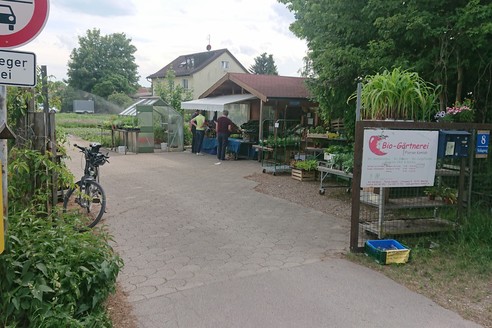
At the Western edge of town, in Pasing the organic market garden of Bio-Gärtnerei Kamlah has a farm shop open on Monday, Wednesday and Friday afternoons. You can not only buy salads and vegetables grown here but also organic seedlings for your balcony or garden patch. The farm has also a market stall at the Pasinger Viktualienmarkt which keeps open all days except Sunday offering a huge selections of organic fruit and veges, but no seedlings.
Tea shops
While coffee is readily available from
loose weight convenience stores, tea drinkers aren't well catered for: Usually you will find some tisanes and one or two types of black tea. Fortunately specialist tea shops still exist, and as they sell loose weight teas by the gram don't be shy and ask them to fill your tea box.
In the
Tee Gschwendner shop in the Asamhof backyard a few meters from the new pedestrian street of Sendlinger Straße this will work as long as the opening of your jar or box is wide enough for the shop assistant to fill it without touching it with her shovel. The franchise also sells conventional fare, so make sure to insist on organic quality – "Bio-Qualität" is the keyword. You'll find a decent selection of both, green, black and herbal teas, with and without aromatics. Bring a little time to stroll through the light and pleasant shop that has been at this place since the 1980ies, ask the assistant to show and suggest teas according to your taste and tell a little detail. When all your teas are filled into your jars you will be asked whether you fancy a tea sample, so it is smart to bring an additional small glass or jar.
Mind you that green tea doesn't store well in classic metal tea boxes as this material supports further oxidation processes.
In spring 2022 it turned out to be difficult to buy loose-weight organic flavoured tea as compliance to the EU regulation 2018/848 on organic products had not been established in time.
Coffee and food to take away
An increasing number of coffee places you may lend a Recup coffee cup for a deposit which you can return at any other shop participating in the retour scheme.
Some like the Neulinger bakeries will even give you a small discount for sparing the environment.
Most of the eateries reviewed here will fill your food into the boxes you provide for take-away as long as you make this clear before they start their usual routine which still means one-way packaging. Sushi to take away is available from Sushiya, and they will happily accept your bento boxes with your order.
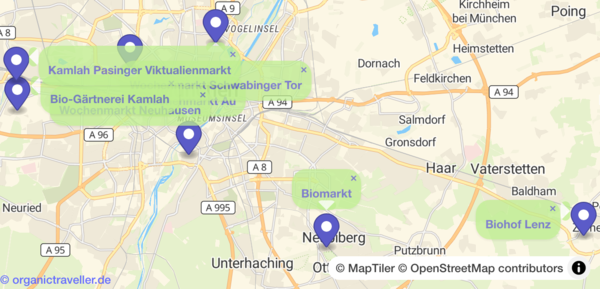
Closed
- Beauty & Nature, Westenrieder Str. 35 (organic fashion, household items and body care, with a range of refill and minimally packaged products; there's a branch left in Leipzig)
- Der plastikfreie Laden, Schlossstr. 7 (Munich's first zero-waste shop, also known as "Plastikfreie Zone", now online only)
- Mutternaturladen, Grünwalder Str. 244
- Mutternaturladen, Tumblinger Str. 45 (inside the Bahnwärter Thiel area
- Ohne, Schellingstr. 42
- Ohne Haidhausen, Rosenheimer Str. 85
- Naturverpacktes Westend Pur, Heimeranstr. 51a
- Evis – ab ins Glas, Pollinger Str. 11, Gilching
- Lela Lose, Freisinger Str. 3, Erding
2025-03-01 14:00:00
[Munich, Neubiberg, Erding, Gilching, Poing, Trudering, Unterfoehring, Wolfratshausen, Zorneding, Leipzig, Au, Haidhausen, Harlaching, Laim, Maxvorstadt, Pasing, Westend, organic, vegetarian, zero_waste, unverpackt, cafe, grocery, market, supermarkets, lunch, bakeries, butcher, tea, bodycare, household, sushi, wine]
[direct link · table of contents]

Thursday, 26 September 2024
While thriving during the covid-19 pandemics, package-free supermarkets have been facing hard times thereafter, and in big cities with high rents we've seen a wave of shop closings.
Even the beautiful grocery Wunderbar unverpackt ("Wonderfully devoid of packaging") which opened in May 2018 wasn't able to survive and closed for good in 2023.
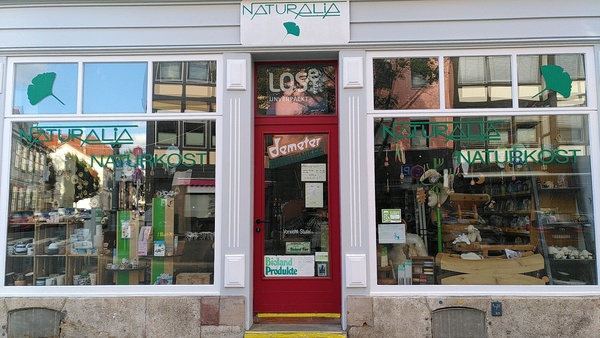
To refill dry food supplies from gravity bins pay a visit to the Naturalia grocery at Wöhlerplatz, a traditional crammed organic corner shop which offers a small assortment of dry food (pasta, cereals, nuts, rice and the like) in self-service dispensers. Apart from this eggs, bakery items, fruits, veges and cheese can be taken home in your own jars and bags. In addition the place is also a tea shop – so bring your tea boxes for refill. If you stay in town for a longer period of time consider to collect stamps on the Göttingen Climate Card ("Klima-Karte") here each time you use your own bag or box. When you collect 16 stamps from a number of (not necessarily organic) shops, market boothes and restaurants in town you will be rewarded with a climate-positive goodie bag and earn support for climate projects in town.
The shop-keeper seems to run a small farm herself as she asks for apologies in case she'd appear in the shop past 10 am, to help sheep giving birth.
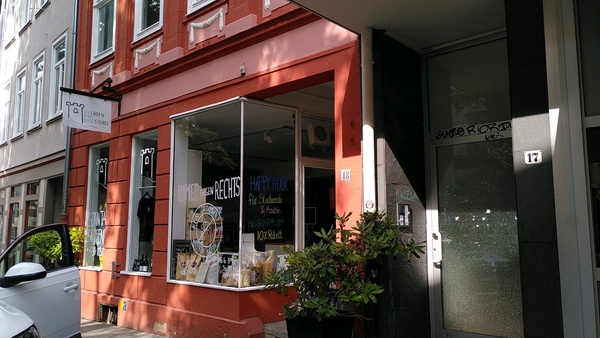
The second organic grocery to collect Climate Card stamps from is the Bioladen an der Burgstraße, a dedicated anti-fascist neighbourhood grocery next to Cafe Inti. A few years ago this cosy full-retailer replaced a
branch of an organic bakery based in Klein Lengden with shops both there and in Göttingen, delivering to many organic markets in the greater region. The Sunday-open place has the air of a traditional organic corner shop and makes an extra effort to offer products packaged in returnable glasses, among others wine gums. More liquorice and jellies can be bought by the piece, and together with the cheese and bakery counter (which fills about half of the entire location), the racks with fruit and veges and the dairy products and drinks in deposit glasses and bottles my estimate is that more than half of the goods can be bought without disposable packaging. You can fetch a coffee in your own mug or a deposit cup.
The shop also has an innovative approach to keep away wasps from ripe fruits: small trays filled with over-ripe fruit juice on a window sill a little apart from the entrance attract the insects which are occupied there as long as you don't disturb them.
The second and much larger organic supermarket in the inner city belongs to the
Alnatura chain. Although it doesn't have an explicit focus on zero waste the staff at the bakery cum cheese counter is happy when you come with your own boxes and bags, and there's a good selection of products in deposit glasses and bottles. There are no cafe tables and chairs, but you can take out coffee drinks and tea (in deposit mugs) and choose from a great selection of sandwiches. Even in the evening hours you will usually still find a sandwich.
Geismar and Diemarden
The Gemüseladen in the Western suburb of Geismar, near the church of St. Martin, is not participating in the Klima-Karte scheme. However, this organic greengrocery is offering an abundance of regional produce which you can take home in your own bags.
On the other side of the street you'll find
Le Bol, a bio-dynamic organic French-German artisanal sourdough bakery – according to locals making the best bread in town. Needless to say that you can come with your own bag and that the bread keeps fresh much longer than ordinary fare. Given that the baker has to rise early so you can have fresh bread in the morning, opening hours are restricted to the morning ihours except on Thursdays.
If you are on a bike tour or stay in town a little longer consider a visit to the
Naturmilchhof Gartetal organic dairy farm. To get their continue from Geismar to the village of Diemarden about four to five kilometres away. Buying fresh milk, oat drink, yogurt, kefir or cheeses from the farm's own dairy is unfortunately somewhat inconvenient as you must register at the farm's web shop to use their self-service farmshop guarded by surveillance cameras. Then you would use the computer inside the shop to register your purchase, and your debt will be detracted from your bank account. I haven't checked whether this works with any European bank account. All liquid and semi-liquid products come in returnable plastic bottles and jars with a deposit. The shop is closed on Sundays and public holidays.
Non-food
Household items supporting a package-free lifestyle can be found at the factory outlet of the eco postal order shop Waschbär near Geismartor. Here you may also refill cleaning agents, liquid soap and detergents to get a stamp on your Climate Card. Unfortunately the shop is going to close for good by the end of October, 2024.
Tea
In the 1990ies owner-driven tea shops offering a great selection of loose-weight teas, herbal and fruit blends were quite a thing, and fortunately they have been surviving in Göttingen so far. With the years, their assortment of organic teas has increased, and I haven't found one who refused to fill my tea boxes (even though you may ask for it verbosely).
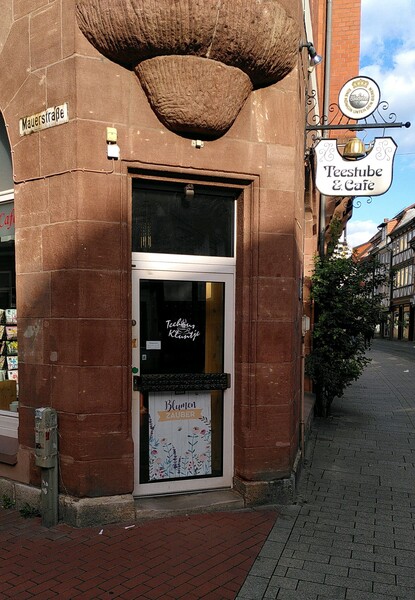
The
Teehaus Kluntje isn't just a nice shop for teas and everything you need for tea ceremonies or small recreational everyday tea breaks, it also serves you a good cup of tea. However, it's a bit too focused on being a gift shop if you prefer tea shops with a reduced atmosphere.
Personally I prefer the wooden interior
of Teehaus Schmidt
which nicely brings out the timber frames of the old house. Here the focus is clearly on tea and spices. An interesting fact: The place was a students' start-up in the 1970ies.
In a city with as many tea lovers you won't be surprised to find a branch of the
Tee Gschwendner franchise. Just like other franchises of this brand they sell more conventional than organic teas, but the shop assistants will show the right types when you ask for "bee-o" (bio) teas and place your tea box on the till.
Fortunately Göttingen still has many cosy carefully curated owner-driven shops. When I tried to visit the traditional confectioners' shop cum delicatessen
Alfred Ewert on recommendation by locals it was too late to find it open, and the products on display in the shop's windows weren't organic. So I decided not to list it here. However, pink@norden.social recommended it as a veritable loose tea shop, so I suggest that you pay a visit and check for organic labels and the "bio" keyword.
Closed
2024-09-26 13:30:00
[Goettingen, Geismar, organic, vegetarian, zero_waste, unverpackt, grocery, supermarkets, bodycare, household, tea, bakeries, sunday_open, farms]
[direct link · table of contents]

Wednesday, 21 August 2024
Dresden's Wilhelminian neighbourhood of Neustadt is dominated by independent shops and venues, many of them run by female entrepreneurs as documented by an art project of local photographer Christine Starke. So it comes as little surprise that it is here where you have the best chance to discover a lot of gems, driven in accordance with the personal principles of the shop keeper which often include social and environmental aspects. Keep your eyes open, and you will discover a lot more than I have to suggest here.

Herbalists and beauty
The old town does not have much to offer in terms of independent and surprising shops, and the Altmarkt-Galerie mall is as boring as these shopping centres usually are. A notable exception is the Sonnentor shop directly located at the mall's entrance at Postplatz, next to the tram-stop at Wallstraße. Franchises of this Austrian producer of organic and fairly traded herbs, teas, condiments, bodycare products and spices are usually located in malls or main shopping areas, neatly designed heavens offering products that are good for both, you, and the farmers and producers involved when you're in the mood for shopping.
If you're on the outlook for herbs, remedies, bodycare and food items based on ingredients described by medieval healer nun Hildegard of Bingen pay a visit to the Marone herbalist shop on Bautzner Landstraße directly located at the east-bound tram stop Pulsnitzer Straße. Not all of the products on sale (which among others include chestnut products and a small selection of biodynamic wine) in this small specialist shop are certified organic though.

Leaving the tram tracks and entering the more pedestrian-friendly quartier natural and organic bodycare products can be found at the
Touch of Nature beauty parlour cum shop in Böhmische Straße east of Rothenburger Straße. Note that this shop is
closed on weekends.
Bicycles
A few steps from Touch of Nature there's a second hand bicycle shop cum workshop, Zwout! (formerly Elbcycles), where you can buy a used or recycled bike if you're staying longer, or get your own one fixed.

Jewellery
If you follow Böhmische Straße until it ends at Alaunstraße. A
luminous blue wall indicates the location of the Geldschneider & Co. steam-punk workshop. Among others you will find beautiful jewellery made from recycled parts of abandoned analog wrist watches. The place has somewhat erratic opening hours, so step by when nearby (if you need to plan ahead: Saturdays seem a safe bet). If closed during regular German shop opening hours you may call the phone number given on the entrance door – except during the Tollwood festival in Munich where the Geldschneider usually runs a booth.
Fair trade
As in many other German cities the first address for colourful gifts as well as organic sweets, spices and condiments are fair-trade shops founded as grassroots activities by Christian parish members in accordance with the conciliar process of mutual commitment (covenant) to justice, peace and the integrity of creation (JPIC). As the host for pioneering regional ecumenical plenums in 1989 and 1990 the city of Dresden has been playing an important role in this process. The spirit of this movement lives on in local fair trade initiatives like Quilombo which for almost 25 years had run a fair-trade shop in the entrance area of Dreikönigskirche in Hauptstraße which played host to the first democratically elected local parliament in Saxony after East Germany's peaceful implosion in 1989. Today the initiative still has a shop in the neighbourhood of Löbtau while their former place in the "Haus der Kirche" ("house of the church") has been converted into fair-trade
Cafe Dreikönig.
Sharing their roots with the Quilombo NGO the team of
Cafe Aha opposite Kreuzkirche runs a fair-trade shop in the heart of the city. It is located in the basement of the cafe and offers an impressive selection of fairly-traded gifts, body care and dry goods. This initiative also runs a fair-trade ...

Fashion
... boutique, Aha Naturtextilien, on Hauptstraße, offering a great selection of fairly traded fashion made from natural materials. Here you will also find a good selection of stationary, jewellery, eatable fair-trade goods and more. By the way: the name "Aha" is an abbreviation for "trade/act differently" ("anders handeln" in German), and implies a huge effort in not only selling fairly traded goods but offering fair conditions to their own employees.
Another centrally located fair-trade shop specializing in fashion and household accessories as well as coffee and chocolates is Contigo near the central train station.
For more ethically produced and sustainable cocooning items visit Tranquillo, a likewise colourful fashion-and-things boutique cum fashion label in the Neustadt neighbourhood, at the crossroad Louisenstraße/Rothenburger Straße. They produce their own women fashion entirely made from organic textiles focussing on basic colours – if you like Aha Naturtextilien don't miss this one. There's also a sustainable furniture outlet cum cafe on the other side of the train tracks to Neustadt trainstation.
If you like loose-fitting clothes, either unicolour or with colourful patterns head to the Dresden branch of
Mrs. Hippie. Their own brand is made in Poland, and all clothes are predominantly made from natural fibers, often organically certified, or rayon/viscose. However, they are not necessarily free of elastane.
Dresden's first fashion boutique exclusively selling fairly produced clothing from fairly traded, organically grown materials is dubbed
Populi and
can be found at the Western end of Louisenstraße, just before you reach the tram tracks of Königsbrücker Landstraße.
Both, streetware, denim and designer labels can be found here, for men and women. The interior of the shop is to a great deal made from upcycled furniture.
Students and nerds find fairly traded organic cotton t-shirts and sweaters with unique scientific prints at Unipolar, and everyone else organic streetware for both, men and women. This small, Dresden-based fashion label is the brain-child of a former physics student. The original store between the Bahnhof Mitte train station and the "Carl Maria von Weber" College of Music does no longer exist. (But if you already are here: the VG warehouse next to this old location has a well-assorted organic fashion section upstairs.)

As of 2024 Unipolar consists of two shops on both sides of Rothenburger Straße in the Neustadt neighbourhood, one selling clothing, and the other shoes and sustainable household gear. Finding the shops is easy: Simply spot the bath tub opposite the tram stop.
More colourful organic streetware, less nerdy prints, and open late on Fridays and Saturdays – that's
El Dorado Street Fair in Alaunstraße.

Before the arrival of noisy and cheap looking street food shops this street, the entrance to the Neustadt neighbourhood, was populated by numerous owner-run, carefully curated fashion boutiques and second-hand shops catering for a diverse crowd. Some of them have been surviving, and I'm more than happy that this shop venue, after the closing of El Dorado's predecessor, Invito, remained an organic fashion boutique.
Babies and toddlers
If you are on the look-out for beautiful, not overly sweet organic fashion for toddlers and smaller children or simply for beautiful organic garments step by Elvida in Louisenstraße approximately opposite Planwirtschaft pub and cafe. There you'll find the small flagship store of a Dresden-based sustainable kids fashion label – and a source for organic sewing things.
The following places shut down, so don't be mislead when you find references to them on the web:
- Quilombo, Haus der Kirche, Hauptstr. 23 (fair-trade)
- Baum&Wolle, Alaunstr. 13c (fashion)
- Ex Animo, Martin-Luther-Str. 17 (fashion and things)
- Hüpenthal Boutique, Bautzner Str. 63 (bespoke tailor, I miss your beautiful collars, r.i.p., Herr Hüpenthal!)
- Invito, Alaunstr. 20 (fashion, suceeded by El Dorado Street Fair)
- Lipfeins Lieblinge, Rothenburger Str. 1 (organic lipcare, factory outlet – their products can of course be obtained online or (e.g.) from one of the VG supermarkets)
- LouisdoOr, Louisenstr. 4 (sustainable toys and baby clothing)
- Tranquillo Outlet,
Louisenstr. 45 (organic fashion, visit them here)
- Unipolar Mitte, Jahnstr. 1
(streetware, visit them here)
- Un-Kraut, Martin-Luther-Pl. 12 (herbs and spices)
2024-08-21 17:30:00
[Dresden, Neustadt, shopping, organic, fair, fashion, shoes, spices, tea, herbs, delicatessen, gifts, upcycling, steampunk, bodycare, furniture, household, children, toys]
[direct link · table of contents]

Wednesday, 21 February 2024
If you are looking for pioneers in the German zero waste movement you'll find one of them in Dresden's Neustadt neighbourhood:
Bring a selection of glasses, containers and bags and stop by Lose ("loose-weight"), a cosy zero-waste corner store in Böhmische Straße. Unlike other package-free supermarkets this one does not only sell dry food, natural body care and household chemicals but also offers veges and has a cheese counter. Although most of the products are organic some are not, so you might want to check the labels on the suspenders for the bio keyword or ask.

The interior of the shop was refurbished and is now much lighter and seems spacier than before. The reason for this is that the coffee corner which had been there before the corona pandemic has decreased and the serviced counter for bakery products, cheeses, antipasti and coffee moved from the entrance area to the backpart of the shop. Mind you: like other package-free shops Lose does not have an illuminated window front, so be brave to try the door handle – the place may look quite dark even when open.
Supermarkets with zero-waste stations
Moreover all shops of the co-operatively organised local wholesale chain VG Biomarkt offer a good selection of loose-weight organic dry goods (in addition to an abundance of often locally produced fruit and veges and dairy products and drinks of all kinds in returnable glass bottles).

Their main shop is located near
Bahnhof Mitte train station, an entire organic warehouse on the premises of a former newspaper printing plant. Standing back from the main street the first floor is occupied by an organic convenience store supporting your zero-waste efforts. On the second floor there's a well assorted organic fashion store mainly for babies, children and women, with a section offering organic body care, household chemicals, sustainably produced toys, stationary and more.
For members prices are lower, but the shop is open to everyone.
On weekdays the self-service bistro directly facing the street offers delicious lunch (only snacks on Saturdays), and there's a cafe cum bakery shop featuring young local artists.

VG Biomarkt also has branches in the neighbourhoods of Neustadt (Hechtviertel), Striesen, Johannstadt, Strehlen, and Loschwitz,
Mind you that the one in Striesen, at Polandplatz isn't easy to find: Opposite the triangular park there's a driveway which one can easily miss as no sign at the entrance points to the shop. Be brave an move past, you'll find the shoü at the right hand site.
If you want to return empties, find the appropriate crate in the entrance area, pin down its code, tell the cashier and put the glass or bottle at the appropriate place.
The Loschwitz branch dubbed VG Balsamico is conveniently located
opposite the downhill station of the cable-run suspension railway ("Schwebebahn") next to
Körnerplatz at the northern end of Blaues Wunder ("blue wonder") bridge.
Opening hours and assortment (of loose-weight products as of products in returnable glasses) vary depending on the size of the market and the neighbourhood. However, all VG markets offer free drinking water refill stations and you can book cargo bikes to transport your purchase home free of charge.
While many organic groceries were closing, the Verbrauchergemeinschaft opened a new large supermarket with attached self-service restaurant cum cafe in 2023: The
VG Friedensstraße offers and abundance of loose weight and unpackaged products. Want to shop products grown or made in the vicinity? Watch out for the green "RP" ("regional partner") logo.
While these local groceries were early adopters a number of nation-wide operating organic supermarket chains have been following. In Dresden the two remaining branches of the Berlin-based supermarket chain Bio Company introduced dry food suspenders for use with your own jars.

In 2021 the Denns Biomarkt was the first branch of this chain where I found a dedicated shelf with fairly traded dry food in retour glasses and a few gravity bins with nuts, seeds, rice and noodles. A start at least, although I have my doubts that this small selection will be sufficient to nudge people towards the extra effort it takes to bring along glasses and jars.
Without offering gravity bins the Vorwerk Podemus farm supermarkets supports package-free efforts, too: Hand over your own clean boxes and bags when buying meat and meat products, cheese, bread, rolls or cake from the services counter, and prefer returnable glass bottles and glasses when choosing jogurt, honey and jams.
Farmshops and factory outlets

When you take the Elberadweg bicycle route on the southern shore in direction Niederwartha you'll pass a nice old farmyard, the organic Bauernhof Franz in Niedergohlis. It runs a subscription scheme – phone in or e-mail your order until Wednesday and collect it from the farmshop on Fridays and Saturdays, but if you happen to step by on one of these days and there's someone around you may be able to buy vegetable oil and perhaps also potatoes or other produce from the farm. But of course, shopping their farm products from one of the VG supermarkets might be easier.
In 2022 Vegannett, a Weißer Hirsch-based producer of vegan spreads, started filling products in standardized returnable deposit glasses which
you can buy directly from the manufacturer on Wednesdays.

More to try
For more vegan alternatives to cheese, meat and sausages head for
Die vegane Fleischerei in the Neustadt. January, 2023 a vegan "butcher shop" opened here, and they assured me that all of their products are made from predominantly organic ingredients.
They also offer ready-made "meat" salads and soups, and I'm looking forward to visit the shop in person. Don't forget to take boxes and jars with you.
Closed
2024-02-21 04:00:00
[Dresden, Neustadt, organic, coffee, vegan, zero_waste, unverpackt, cafe, grocery, market, supermarkets, bodycare, household, hemp]
[direct link · table of contents]

Saturday, 25 November 2023
For (re-)filling your kitchen cupboard and shop for un(pre)packaged food head straight to the northern shore of the Neckar river, to the Neuenheimer Markt market place. On Wednesday mornings (until 1 pm) a farmer's market is held here, but a few steps
away
you will also find the city's only package-free supermarket dubbed Annas Unverpacktes ("Anna's unwrapped goods") which with its outer wall made of turquoise tiles looks like a converted butcher's shop from the outside. As all zero waste convenience stores I've come across so far it's strictly vegetarian, but omnivores simply walk outside and turn left to find an artisanal butcher's shop at the next corner.

Until some years ago the Metzgerei Blatt was working according to the Neuland principles of animal welfare in meat production which are close to, but not fully organic, and in 2015 turned to fully organic principles. The shop was closed when I went there (as it's generally closed on Wednesday afternoons), but the owner assured me that the staff would fill my purchase into my own clean boxes as long as they were intended for personal consumation (instead of catering a bigger crowd). Ready-to-eat meat dishes are also available to take away.
Directly opposite the Neuenburger Markt there's also a shop of the local wholefood bakery Mahlzahn named after the dragon in Michael Ende's famous children's novel "Jim Button and Luke the Engine Driver". Here the shop assistants will happily put your bread, rolls, sweet and savoury pastries into the bags or containers you present.

The bakery workshop itself is located in the Weststadt neighbourhood where you also can buy a small selection of loose-weight seasonal fruit and veges and assorted pre-packaged organic food items to supplement your breakfast, lunch or coffee table. When I went there in hope for an early organic breakfast it however turned out that this bakery doesn't follow the zeitgeist to serve coffee and snacks to eat on the spot everywhere -- no coffee machine here, no bar tables. (The rolls were delicious nevertheless.)
Mind you that this bakery does not use white flour at all.
Altogether there are four Mahlzahn shops, all with identical opening hours, the third one located in the neighbourhood of Rohrbach, and the fourth in Handschuhsheim (literally: "glove's home").
In general you will have difficulties to find organic bakeries not willing to fill customer-provided clean bags and boxes, and the new (in 2023) Zeit für Brot shop thankfully make no exception.
To buy all items for a zero waste breakfast at one stop head for the city's branch of the Denn's organic supermarket chain: The staff at its meat, dairy and bakery counters offers to fill cheese, cured meat products, sausages and bakery items into your containers. If you buy a coffee drink on the go in your own cup you'll receive a 30 cents discount, and you can also buy lunch to take away in your own jars instead of having it at the self-service bistro.
The other nationwide operating organic supermarket brand, Alnatura, operates three branches in town. They do not have a dedicated focus on zero waste, but there's a slowly increasing assortment of food in returnable glasses (e.g. mayonnaise, "canned" corn and other preserves, or vegetable spread) apart from unpackaged fruits, vegetables, and bakery produce. Unfortunately you must be familiar with the glass types to find them, and they are always among the most expensive options.
If you prefer independent shops the two Fair & Quer supermarkets in the neighbourhoods of Handschuhsheim and Wieblingen are worth a try.
Unfortunately I did not have the chance to visit them (as advised by my Mastodonbubble), so I cannot say whether their waste and package reduction measures exceed those of comparable dedicated organic supermarkets in Germany.
The shop in Wieblingen offers organic lunch Monday through Friday from noon to 2pm.
Student initiatives
I wasn't much surprised to hear from my Mastodon bubble about zero-waste and repair initiatives run by the university's students' parliament. Unfortunately I have not had the time to visit the campus, but I happily list them here: The self-service bike repair shop Urrmel and the package-free organic food co-operative Appel un' Ei. The latter is located between "Chez Pierre" and "Café Botanik" at the university's main refectory and is regularly offering lunch made with produce from a communal market garden.

More to try
Here are a few more shops which I found during my research but didn't manage to visit myself:
Closed
You may still find references to the following organic grocery on the web, but be assured it's no longer there:
2023-11-25 22:30:00
[Heidelberg, organic, vegetarian, zero_waste, unverpackt, cafe, grocery, supermarkets, butcher, lunch, snacks, coffee, bodycare, household]
[direct link · table of contents]




























